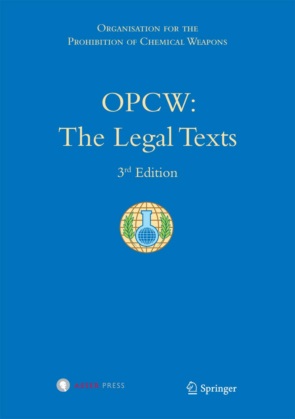
OPCW: The Legal Texts, 3rd Edition
December 2014Order
Details
- Published: December 2014
- Pages: xxii + 783 pp.
- Publisher: T.M.C. ASSER PRESS
- Distributor: Springer
- Formats: Hardcover, eBook and online on SpringerLink
- ISBN: 978-94-6265-043-5
- E-ISBN: 978-94-6265-044-2
First compiled by Lisa Woollomes Tabassi, edited by The Office of the Legal Adviser
The Convention on the Prohibition of the Development, Production, Stockpiling and Use of Chemical Weapons and on Their Destruction entered into force on 29 April 1997, banning an entire category of weapons of mass destruction. The treaty sets a time frame to destroy all stockpiles of chemical weapons held by States Parties and all facilities used to produce them. The Convention requires restriction and regulation of production and trade in toxic chemicals and their precursors. In addition to increased international security, States Parties benefit from assistance and protection against the threat of use or the actual use of chemical weapons. They also enjoy the fullest possible exchange of chemicals, equipment and scientific and technical information relating to the development and application of chemistry for peaceful purposes.
To achieve these broad objectives, to monitor compliance and to provide a forum for State Parties, the convention established an international organisation in The Hague, the Organisation for the Prohibition of Chemical Weapons (OPCW). The OPCW is composed of three organs: the Conference of the States Parties, the Executive Council and the Technical Secretariat, which includes an international inspectorate to carry out on-site verification and monitoring of facilities and chemical plants located in the territory under the jurisdiction of every State Party around the globe. The Conference has also established a number of subsidiary organs to support the implementation of the Convention.
The Chemical Weapons Convention was a compromise text negotiated in a multilateral forum over the course of two decades at the end of the last century. Actual implementation of the complex text requires interpretation by the OPCW organs. OPCW: The Legal Texts was originally published in April 1999 and was revised and republished in 2009. It brought together in a single volume the text of the Convention, interpretative decisions, policies, model agreements, rules of procedure, regulations and key background texts. This new edition of OPCW: The Legal Texts includes additional materials, new issues, and updated versions of several documents, providing a comprehensive overview of the successful operation of the Convention regime over the seventeen years that have passed since the Convention entered into force. The new edition serves as a useful guide to practitioners, academicians, students and experts on chemical weapons issues.
